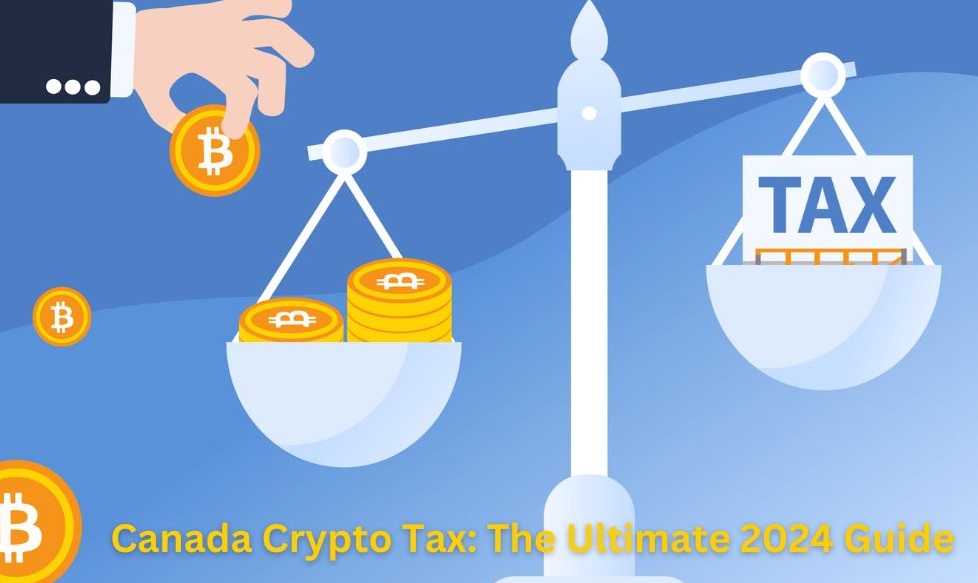In Canada, the cryptocurrency is considered as property. Gains from cryptocurrency are taxed as business income or capital gains under the rates of Income tax. The Revenue Agency of Canada considers cryptocurrency as a commodity subject to income tax and capital gains tax.
100% of business income and 50% of capital gains are considered taxable by the revenue agency. In this article, we describe how cryptocurrency is taxed in Canada, how to report taxes, and the effective methods to decrease tax liability.
Rates Of Crypto Tax in Canada In The Year 2024
Crypto capital gains are taxable at the same rate as that of Federal Income Tax and Provincial Income Tax in Canada. You will have to pay 50% of total capital gains if you are an individual crypto. On the other hand, professional day traders will have to pay around 100%. The crypto tax rates for the year 2024 in Canada are:
| Federal Income Tax Bands (CAD) | Income (2022) | Income (2023) |
| 15% | On first taxable income of $50,197 | On first taxable income of $53,359 |
| 20.5% | $50,197- $100,392 | $53,359- $106,717 |
| 26% | $100,392- $155,625 | $106,717-$165,430 |
| 29% | $155,625-$221,708 | $165,430-$235,675 |
| 33% | $221,708 | $235,675 |
These taxes are applicable in all the territories except Quebec.
Tracking Of Crypto
The Canadian government can trace cryptocurrency transactions. Cryptocurrency exchanges are compulsory to report transactions that exceed $10,000 to the Revenue Agency of Canada.
If any transaction does not exceed the threshold, Canadian stock exchanges must take customer information and disclose it. Canadian Revenue Agency has full transparency in the crypto mining or trading activity and reports all the crypto transactions.
Every transaction is reviewed to track certain illegal activities such as tax fraud and money laundering acts. Cryptocurrency exchanges must report transactions that exceed $10,000 to the revenue agency.
In addition, cryptocurrency transactions such as Bitcoins and Ethereum are visible publicly. Many tax agencies around the globe will check the blockchain and match anonymous wallets with some known investors.
Income Tax Brackets In The Country
After discussing the various things of Canada’s crypto tax, let us have a look at the income tax brackets in Canada. In the year 2022, the tax-free federal basic personal amount was $14,398 for individuals with a net income of $155,625 or lower. In the year 2023, the federal basic personal amount for the individuals who are filing for 2024 has gone up to $15,000. This amount applies to individuals with a net income of $165,430 or less.
Ways To Calculate Capital Gains And Losses in Canada
It is necessary to know the cost basis in Canada to calculate the capital gains and losses. The cost basis is the original cost to acquire cryptocurrency. Canada Revenue Agency needs an adjusted costing method to calculate capital gains and losses on cryptocurrency. ACB is the total average cost of each cryptocurrency unit.
Deadline To Report Crypto Taxes
The tax year in Canada starts from 1st January to 31st December. Taxpayers must report all the taxable transactions on the tax return. The deadline to report taxes to the revenue agency is 30th April after the tax year ends.
Tax-Free Crypto Transactions in Canada
Here is the list of all the tax-free crypto transactions in Canada:
- Crypto in the form of a gift
- Purchasing and holding crypto with fiat
- Decentralized Autonomous organization
- Moving crypto between wallets that you own
Methods To Reduce Cryptocurrency Taxes in Canada
Individuals cannot evade taxes but they can try some methods to reduce their tax liability such as:
1. Losses of Cryptocurrency
Any cryptocurrency loss can offset capital gains and decrease tax liability.
2. Hold ETFs in a tax-free savings account
Every Canadian has the right to deposit money in a tax-free savings account. One cannot hold crypto in this account but can hold ETFs that can track the rate of various cryptocurrencies such as Ethereum and Bitcoin.
3. Writing Off Expenses
In the cryptocurrency business, it is possible to write off the associated expenses of the business. Mining businesses can write off the cost of equipment and electricity.
4. Transaction Fees
Transaction fees in trading cryptocurrency can be added to any adjusted cost basis and help to decrease the total capital gains.
Things Required Filing Crypto Taxes in Canada
The important things for filing crypto taxes in Canada are as under:
- Fair market value of every asset upon receipt and disposal
- Date for every crypto transaction
- Cryptocurrency addresses and wallet data
- Total amount of tokens bought and sold or traded
- Records of exchange
- Accounting and legal fees
- Cryptocurrency addresses of parties that you trade with
Final Words
This is the full guide to Canada Crypto tax with all the details. You can get a ASIC miner to start crypto mining the various coins right from your home or workplace. Crypto mining hardware will save time and effort and helps to make a report in a few minutes.


